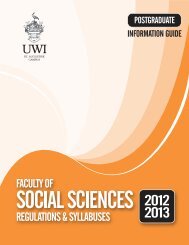Faculty of Humanities and Education (Postgraduate) - The University ...
Faculty of Humanities and Education (Postgraduate) - The University ...
Faculty of Humanities and Education (Postgraduate) - The University ...
You also want an ePaper? Increase the reach of your titles
YUMPU automatically turns print PDFs into web optimized ePapers that Google loves.
POSTGRADUATE REGULATIONS & SYLLABUSES 2012 - 2013<br />
THE FACULTY OF HUMANITIES & EDUCATION<br />
REFERENCES<br />
Abraham, S. (1994) Exploratory action research for manager<br />
development. Brisbane, Australia: ALARPM Inc <strong>and</strong><br />
Gibaran Management Consultants Pty Ltd.<br />
Altrichter, H., Posch, P., & Somekh, B. (1993) Teachers investigate<br />
their work: An introduction to the methods <strong>of</strong> action<br />
research. London: Routledge.<br />
Anderson, L. A., & Anderson, D. W. (2001). Beyond change<br />
management: Advanced strategies for today’s<br />
transformational leaders. San Francisco, CA: Jossey-Bass/<br />
Pfeiffer.<br />
Angwin, J. (1998). <strong>The</strong> essence <strong>of</strong> action research. Geelong: Deakin<br />
Centre for <strong>Education</strong> <strong>and</strong> Change, Deakin <strong>University</strong>.<br />
Greenwood, D. J., & Levin, M. (1998). Introduction to action<br />
research: Social research for social change. Thous<strong>and</strong><br />
Oaks, CA: Sage.<br />
Kember, D. (2000). Action learning <strong>and</strong> action research:<br />
Improving the quality <strong>of</strong> teaching <strong>and</strong> learning. London:<br />
Kogan Page.<br />
Lieberman, A., & Miller, L. (1999). Teachers transforming their<br />
world <strong>and</strong> their work. New York:Teacher’s College Press.<br />
McLean, J. E. (1995) Improving education through action research:<br />
A guide for administrators <strong>and</strong> teachers. Thous<strong>and</strong> Oaks,<br />
CA: Corwin.<br />
Mills, G. E. (2003). Action research: A guide for the teacher<br />
researcher (2 nd ed). Upper Saddle River, NJ: Merrill.<br />
Schmuck, R. (1997). Practical action research for change.<br />
Arlington Heights, IL: Skylight Training <strong>and</strong> Publishing.<br />
Zuber-Skerritt, O. (Ed.). (1996). New directions in action research.<br />
London: Falmer.<br />
YEAR:<br />
SEMESTER:<br />
COURSE CODE: EDEA 6117<br />
COURSE TITLE: MANAGEMENT OF EDUCATIONAL SYSTEMS<br />
AND PROGRAMMES 1<br />
NUMBER OF CREDITS: 4<br />
COURSE DESCRIPTION:<br />
Overview<br />
This course is divided into two parts – ED61Q <strong>and</strong> ED61T. ED61Q<br />
is a prerequisite for ED61T. World trends in education seem to<br />
suggest that much will be expected, <strong>and</strong> much dem<strong>and</strong>ed, <strong>of</strong><br />
teachers in the present millennium. Further, increasingly the<br />
realities <strong>of</strong> decentralization <strong>and</strong> school-based management are<br />
becoming more challenging. Coupled with these phenomena,<br />
countries both developed <strong>and</strong> developing are now expressing<br />
greater concern for quality <strong>and</strong> relevance in education. Indeed,<br />
national <strong>and</strong> international reports seem to have accepted that<br />
education is closely correlated to economic development, social<br />
welfare, <strong>and</strong> world peace. However, the problem is: Who will be<br />
the generals <strong>of</strong> this new thrust in education? Politicians have<br />
formulated <strong>and</strong> will always continue to formulate educational<br />
policy, but in very real terms the responsibility for translating<br />
policy into reality rests ultimately with administrators at the<br />
macro level in general <strong>and</strong> the micro levels in particular.<br />
OBJECTIVES<br />
Students will:<br />
1. develop the skills, attitudes, <strong>and</strong> competencies to help<br />
them cope with the imperatives <strong>and</strong> m<strong>and</strong>ates for running<br />
educational organisations in a context <strong>of</strong> rapid change;<br />
2. commit to an underst<strong>and</strong>ing <strong>of</strong> leadership known as<br />
transformational leadership;<br />
3. demonstrate use <strong>of</strong> information <strong>and</strong> communication<br />
technologies in re-conceptualising, redesigning, <strong>and</strong> reengineering<br />
solutions to problems within their schools;<br />
4. apply underst<strong>and</strong>ings <strong>of</strong> human resource management,<br />
development planning, curriculum management, <strong>and</strong><br />
evaluation in managing their schools.<br />
CONTENT<br />
Module 1 - Preliminary Perspectives<br />
• Introduction <strong>and</strong> overview <strong>of</strong> the course<br />
• Secondary school organisation in Trinidad <strong>and</strong> Tobago<br />
• Introduction to the management <strong>of</strong> educational<br />
programmes with emphasis on the law <strong>and</strong> ethics<br />
• Managing educational change<br />
• School administration management <strong>and</strong> information<br />
technology: An overview, challenges <strong>and</strong> possibilities<br />
• Introduction to data base management<br />
Module 2 - Development Planning<br />
• <strong>The</strong> Nature, dynamics, <strong>and</strong> importance <strong>of</strong> development<br />
planning<br />
• Introduction to project planning <strong>and</strong> proposal writing<br />
• Policy formulation, implementation, <strong>and</strong> evaluation in the<br />
secondary school sector<br />
• Community relations <strong>and</strong> extending the resource base <strong>of</strong><br />
secondary schools<br />
• School effectiveness <strong>and</strong> school improvement in the<br />
secondary school sector<br />
Module 3 - Human Resource Management<br />
• Managing people strategically for collegiality, efficiency,<br />
effectiveness, <strong>and</strong> job satisfaction<br />
• Organizational culture <strong>and</strong> climate<br />
• <strong>The</strong> learning organization<br />
• Human resources development<br />
• Organizational renewal<br />
• Conflict resolution in our schools<br />
• Systems <strong>of</strong> student control with emphasis on the<br />
democratic <strong>and</strong> humane: An overview, rationales, relevance,<br />
<strong>and</strong> effectiveness to our secondary school sector<br />
• Performance management <strong>and</strong> appraisal in secondary<br />
schools<br />
Methods <strong>of</strong> Delivery<br />
• Introductory lectures to emphasize the extent <strong>and</strong> depth<br />
<strong>of</strong> the topic as well as areas <strong>of</strong> particular importance <strong>and</strong><br />
concern<br />
• Organizing issues for deliberation <strong>and</strong> activities so that<br />
participants will be able to have opportunities to simulate<br />
the creation <strong>of</strong> new cultures for their school<br />
• Ensuring that participants make use <strong>of</strong> opportunities<br />
provided for intense interaction, discussion, <strong>and</strong> reflection<br />
121

















